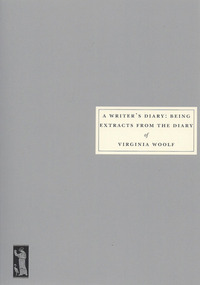Take a photo of a barcode or cover
108 reviews for:
A Writer's Diary: Being Extracts from the Diary of Virginia Woolf
Virginia Woolf, Lyndall Gordon, Leonard Woolf
108 reviews for:
A Writer's Diary: Being Extracts from the Diary of Virginia Woolf
Virginia Woolf, Lyndall Gordon, Leonard Woolf
challenging
dark
emotional
hopeful
informative
inspiring
reflective
sad
tense
slow-paced
emotional
reflective
slow-paced
My copy of A Writer's Diary—I tried to post a photo, but Goodreads just couldn't deal with whatever it was I had to offer—has a forest of little tags poking out from the side. All the passages I've marked.
As a writer, I move between despair and joy on a daily basis. A good day of writing leaves me scoured clean and refilled with peace;
There is some ebb and flow of the tide of life which accounts for it; though what produces either ebb or flow I'm not sure.
but the stress of rejection and of praise is such an invasion of the external world into my inner equilibrium.
...the worst of writing is that one depends so much upon praise. One should aim, seriously, as disregarding ups and downs; a compliment here, silence there.
The only way to right the imbalance is to shut out the world and offer myself up to the page. To sit and write until my limbs are stiff, my eyes ache, my brain empties out.
The truth is that writing is the profound pleasure and being read the superficial.
Then, to take a walk, letting the words sift from my head down to my toes. When I return home, I have room for the words of others.
The way to rock oneself back into writing is this. First gentle exercise in the air. Second the reading of good literature.
A Writer's Diary show the decades of a writer's life unfolding in real time: the highs and near-shame of success; the deep, quiet pleasures of the life of the mind; the fear and resignation of failure, which is usually far more a product of the writer's imagination than of the external world.
Arrange whatever pieces come your way. Never be unseated by the shying of that undependable brute, life, hag-ridden as she is by my own queer, difficult, nervous system.
What would Woolf make of the cult of personality she has become?
Now I suppose I might become one of the interesting–I will not say great–but interesting novelists?
What would we have made of her work, what more could she have offered us, if mental illness had not had the final say, if she could have found her way to a different final chapter?
A thousand things to be written had I time; had I power. A very little writing uses up my capacity for writing.
I remarked to another writer what an inspiration this book is to me, what comfort I have found in Woolf's own struggles and doubts. She reminded me how things ended for Woolf. That she took her own life. How strange a response. She missed the point entirely. Instead of being haunted by Woolf's end, I think of Mary Oliver's poem, "The Summer Day" Tell me, what is it you plan to do with your one wild and precious life? Oliver asks.
Here is how Woolf would have answered:
Now is life very solid or very shifting? I am haunted by the two contradictions. This has gone on for ever; will last for ever; goes down to the bottom of the world—the moment I stand on. Also it is transitory, flying, diaphanous. I shall pass like a cloud on the waves.
Virginia Woolf passed like a cloud on the waves. But her words have become moments upon which we all stand, strengthened, made taller by the foundation of her genius. And we look up at those clouds, mouthing, Thank you.
As a writer, I move between despair and joy on a daily basis. A good day of writing leaves me scoured clean and refilled with peace;
There is some ebb and flow of the tide of life which accounts for it; though what produces either ebb or flow I'm not sure.
but the stress of rejection and of praise is such an invasion of the external world into my inner equilibrium.
...the worst of writing is that one depends so much upon praise. One should aim, seriously, as disregarding ups and downs; a compliment here, silence there.
The only way to right the imbalance is to shut out the world and offer myself up to the page. To sit and write until my limbs are stiff, my eyes ache, my brain empties out.
The truth is that writing is the profound pleasure and being read the superficial.
Then, to take a walk, letting the words sift from my head down to my toes. When I return home, I have room for the words of others.
The way to rock oneself back into writing is this. First gentle exercise in the air. Second the reading of good literature.
A Writer's Diary show the decades of a writer's life unfolding in real time: the highs and near-shame of success; the deep, quiet pleasures of the life of the mind; the fear and resignation of failure, which is usually far more a product of the writer's imagination than of the external world.
Arrange whatever pieces come your way. Never be unseated by the shying of that undependable brute, life, hag-ridden as she is by my own queer, difficult, nervous system.
What would Woolf make of the cult of personality she has become?
Now I suppose I might become one of the interesting–I will not say great–but interesting novelists?
What would we have made of her work, what more could she have offered us, if mental illness had not had the final say, if she could have found her way to a different final chapter?
A thousand things to be written had I time; had I power. A very little writing uses up my capacity for writing.
I remarked to another writer what an inspiration this book is to me, what comfort I have found in Woolf's own struggles and doubts. She reminded me how things ended for Woolf. That she took her own life. How strange a response. She missed the point entirely. Instead of being haunted by Woolf's end, I think of Mary Oliver's poem, "The Summer Day" Tell me, what is it you plan to do with your one wild and precious life? Oliver asks.
Here is how Woolf would have answered:
Now is life very solid or very shifting? I am haunted by the two contradictions. This has gone on for ever; will last for ever; goes down to the bottom of the world—the moment I stand on. Also it is transitory, flying, diaphanous. I shall pass like a cloud on the waves.
Virginia Woolf passed like a cloud on the waves. But her words have become moments upon which we all stand, strengthened, made taller by the foundation of her genius. And we look up at those clouds, mouthing, Thank you.
A Writer’s Diary was first published posthumously in 1953 and is one of Persephone’s new reprints for Spring 2012. The book is composed of extracts from Virginia Woolf’s thirty diaries, unpublished at the time of its original publication. Each extract has been carefully selected by her husband Leonard, whose idea was ‘to extract those entries that show her in the act of writing’.
Lyndall Gordon, a biographer of Virginia Woolf, has contributed a new preface to this edition. Written in October 2011, Gordon describes how Woolf’s ‘darting inspiration and plans to transform the novel or enter into women’s buried lives are netted in A Writer’s Diary’. Gordon’s preface is thoughtful and sets the tone for the book, citing it as ‘a masterpiece in its own right’.
The original preface, written by Leonard Woolf at the start of 1953, has also been included. He states that the ‘book throws light upon Virginia Woolf’s intentions, objects, and methods as a writer’ and consequently ‘gives an unusual psychological picture of artistic production from within’. Leonard Woolf believes that A Writer’s Diary ‘shows the extraordinary energy, persistence, and concentration with which she [Virginia] devoted herself to the art of writing and the undeviating conscientiousness with which she wrote and rewrote’.
The span of the book, ranging from 1918 to the lead up to Virginia Woolf’s eventual suicide in 1941, encompasses her ups and downs, as well as her successes and failures with regard to her writing.
Woolf’s thoughts about other writers and their work have been included throughout. ‘Byron had a superb force’, the Reminiscences by Carlyle are ‘the chatter of an old toothless gravedigger’, and the work of Katherine Mansfield is both admired and belittled. On Ulysses by James Joyce, Woolf states that ‘I have read 200 pages so far – not a third; and have been amused, stimulated, charmed, interested by the first 2 or 3 chapters – to the end of the cemetery scene; and then puzzled, bored, irritated and disillusioned by a queasy undergraduate scratching his pimples’.
The diary features Woolf’s meetings with many other writers, spanning from Thomas Hardy and T.S. Eliot to E.M. Forster and Vita Sackville-West. It is set against a backdrop of two world wars and much upheaval, both in Europe and partly in Virginia’s own life.
The effects which reviews of her work had upon her have been described throughout, sometimes in harrowing ways. ‘I don’t take praise or blame excessively to heart,’ writes Woolf, ‘but they interrupt, cast one’s eyes backwards, make one wish to explain or investigate’. Leonard Woolf has also included extracts which signpost Virginia’s struggles as a writer and her often mystified thoughts on her growing popularity. After the publication of Monday or Tuesday in 1921, she says ‘The truth is, I expect, that I shan’t get very much attention anywhere. Yet, I become rather well known’. Her work for the Times Literary Supplement is also touched upon. Woolf states that ‘when I write a review I write every sentence as if it were going to be tried before three Chief Justices’.
Throughout, Woolf’s prose style is spectacular. Some of the extracts are more spontaneous than others, but all are written with such marvellous clarity. The exacting seriousness of her work is paramount throughout. We, as readers, are given a window into her world and the precise way in which she planned every meticulous detail of her pieces before she began to write. Of her own diary writing, Woolf states that she is ‘much struck by the rapid haphazard gallop at which it swings along, sometimes indeed jerking almost intolerably over the cobbles’. Despite this, each entry is richly written, vibrant, thoughtful and informative, and the piece flows incredibly well as a whole.
The book itself is very well laid out. A chronological bibliography of Woolf’s work has been included, along with a glossary of the main people who feature throughout the diaries.
A Writer’s Diary is a wonderful and an invaluable book, both for writers and for fans of Virginia Woolf and her work. As one of the most revered authors of the twentieth century, Woolf’s writing diary is certainly a worthy addition to the Persephone oeuvre, one that deserves to be read and reread.
Lyndall Gordon, a biographer of Virginia Woolf, has contributed a new preface to this edition. Written in October 2011, Gordon describes how Woolf’s ‘darting inspiration and plans to transform the novel or enter into women’s buried lives are netted in A Writer’s Diary’. Gordon’s preface is thoughtful and sets the tone for the book, citing it as ‘a masterpiece in its own right’.
The original preface, written by Leonard Woolf at the start of 1953, has also been included. He states that the ‘book throws light upon Virginia Woolf’s intentions, objects, and methods as a writer’ and consequently ‘gives an unusual psychological picture of artistic production from within’. Leonard Woolf believes that A Writer’s Diary ‘shows the extraordinary energy, persistence, and concentration with which she [Virginia] devoted herself to the art of writing and the undeviating conscientiousness with which she wrote and rewrote’.
The span of the book, ranging from 1918 to the lead up to Virginia Woolf’s eventual suicide in 1941, encompasses her ups and downs, as well as her successes and failures with regard to her writing.
Woolf’s thoughts about other writers and their work have been included throughout. ‘Byron had a superb force’, the Reminiscences by Carlyle are ‘the chatter of an old toothless gravedigger’, and the work of Katherine Mansfield is both admired and belittled. On Ulysses by James Joyce, Woolf states that ‘I have read 200 pages so far – not a third; and have been amused, stimulated, charmed, interested by the first 2 or 3 chapters – to the end of the cemetery scene; and then puzzled, bored, irritated and disillusioned by a queasy undergraduate scratching his pimples’.
The diary features Woolf’s meetings with many other writers, spanning from Thomas Hardy and T.S. Eliot to E.M. Forster and Vita Sackville-West. It is set against a backdrop of two world wars and much upheaval, both in Europe and partly in Virginia’s own life.
The effects which reviews of her work had upon her have been described throughout, sometimes in harrowing ways. ‘I don’t take praise or blame excessively to heart,’ writes Woolf, ‘but they interrupt, cast one’s eyes backwards, make one wish to explain or investigate’. Leonard Woolf has also included extracts which signpost Virginia’s struggles as a writer and her often mystified thoughts on her growing popularity. After the publication of Monday or Tuesday in 1921, she says ‘The truth is, I expect, that I shan’t get very much attention anywhere. Yet, I become rather well known’. Her work for the Times Literary Supplement is also touched upon. Woolf states that ‘when I write a review I write every sentence as if it were going to be tried before three Chief Justices’.
Throughout, Woolf’s prose style is spectacular. Some of the extracts are more spontaneous than others, but all are written with such marvellous clarity. The exacting seriousness of her work is paramount throughout. We, as readers, are given a window into her world and the precise way in which she planned every meticulous detail of her pieces before she began to write. Of her own diary writing, Woolf states that she is ‘much struck by the rapid haphazard gallop at which it swings along, sometimes indeed jerking almost intolerably over the cobbles’. Despite this, each entry is richly written, vibrant, thoughtful and informative, and the piece flows incredibly well as a whole.
The book itself is very well laid out. A chronological bibliography of Woolf’s work has been included, along with a glossary of the main people who feature throughout the diaries.
A Writer’s Diary is a wonderful and an invaluable book, both for writers and for fans of Virginia Woolf and her work. As one of the most revered authors of the twentieth century, Woolf’s writing diary is certainly a worthy addition to the Persephone oeuvre, one that deserves to be read and reread.
"I am surprised and a little disquieted by the remorseless severity of my mind: that it never stops reading and writing . . ."
This book is hard to finish, because the end of the diary is the end of Woolf's life. And she still had so many things she wanted to write. But at the end you feel this numbness in her, how she wanted to write with nuance and delicacy and was stuck in a raw, catastrophic war.
Also: astonishing to read how many articles were rejected and how much anxiety Woolf had over publishing her best books.
This book is hard to finish, because the end of the diary is the end of Woolf's life. And she still had so many things she wanted to write. But at the end you feel this numbness in her, how she wanted to write with nuance and delicacy and was stuck in a raw, catastrophic war.
Also: astonishing to read how many articles were rejected and how much anxiety Woolf had over publishing her best books.
this isn't exactly prying. leonard woolf presents a very distilled version of her mind. for the public, for her readers and fans, with a clear focus on anything literary, her criticisms, fears, disappointments, perpetual feelings of failure: all in relation to her writing.
but, as with all her autobiographical works, there is the impending date of doom at the end of March, 1941.
but, as with all her autobiographical works, there is the impending date of doom at the end of March, 1941.
One of the most interesting diaries I've read. I'd love to read them unabridged, without Leonard's editing for personal writing, but even with that, they were fascinating. Virginia is one of my favorite people, I think she was brilliant, and I need to read so much more of her work.
This is a wonderful read for anyone who has ever written, wants to write, writes on a regular basis, or loves to literature. She writes regularly about her writing process, as well as what she is reading, thinking, etc.
This is a wonderful read for anyone who has ever written, wants to write, writes on a regular basis, or loves to literature. She writes regularly about her writing process, as well as what she is reading, thinking, etc.





